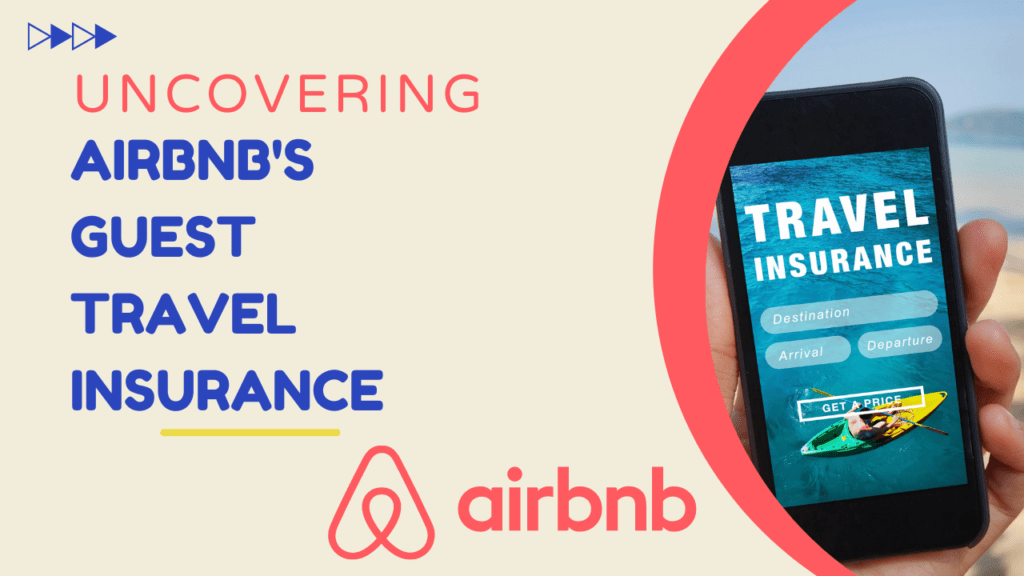Airbnb is rolling out its guest travel insurance in the US, the UK, and 8 countries of the European Union. The company had been working on it for at least two years. Unlike its Aircover for guests program, which is free, this travel insurance is a paid product. Travelers can purchase it while completing their booking. Big insurance company names are behind the insurance program (e.g. Europ Assistance, Generali, AON). Let’s discover what Airbnb’s travel insurance exactly covers, when it can be used, and what impact it can have on existing host cancelation policies. We’ll also see why it is difficult to roll out a travel insurance offering globally.
Airbnb is not the first vacation rental listing platform to be offering travel insurance to its guests. Vrbo has been selling travel insurance products in the US created by Generali (formerly CSA Travel Protection) for years. At a time when online travel agents like Hopper are promising incremental revenues from FinTech products to their investors, it is also good for Airbnb to announce a way to make money on insurance products, after giving away host insurance liability for free, for instance.
Where is Airbnb’s travel insurance available?
Airbnb is launching its guest travel insurance in the following countries:
- the U.S.,
- the U.K.,
- Germany,
- Spain,
- Italy,
- Ireland,
- the Netherlands,
- Belgium,
- Austria,
- Portugal
Airbnb is planning on making its travel insurance available to guests in other countries in the future. Our guess is that Airbnb will then go after other markets in the European Union, such as France, as it already has set some insurance operations within the EU. Then, other countries with similar insurance industry setups such as Australia come could.
Rolling out insurance is really a matter of going at it country by country and even state by state in the US. Insurance regulations are very strong and differ from one country to another in the EU and one state to another in the US.
For countries in South America, parts of Asia, and Africa, things will probably take more time.
What does the Airbnb travel insurance cover and when can a guest make a claim? Disover this trip cancellation insurance which does not infringe existing host cancellation policies.
What the Airbnb travel covers, for instance, in the US:
In the US, the Airbnb travel insurance is powered by the Generali insurance company. The plan includes:
- Trip cancellation: Get reimbursed for up to 100% of your non-refunded Airbnb reservation cost if you cancel for a covered reason, such as: iIllness or injury, flight cancellations and delays due to weather, or mandatory evacuations due to weather.
- Travel delay: Get reimbursed for certain additional expenses you incur because your trip is delayed for 12 hours or more for a covered reason, such as: flight delays, passport theft, or adverse weather.
- Medical: Get reimbursed for doctor-ordered medical services during your trip, such as: hospital services, ambulance services, and prescription medicines.
- Baggage: Get reimbursed for lost, stolen, or damaged baggage, lost, stolen, or damaged travel documents, and unauthorized use of credit cards during your trip.
The plan also comes with other coverages and perks, like 24/7 emergency and travel assistance services. With just a phone call, you can get help with anything from a medical referral to a restaurant recommendation.
What does the Airbnb travel insurance mean for a host?
Airbnb’s travel insurance for guests promises a payment for up to 100% of their non-refunded Airbnb reservation costs if their trip is impacted by specific events, such as
- bad weather,
- stolen travel documents,
- or serious illness.
Airbnb’s travel insurance is more like a trip cancellation insurance that works under certain conditions than a cancel-for-any reason insurance product.
Basically, if a traveler has to cancel their trip:
- The existing host cancellation policy will apply.
- Let’s take the example of a booking made under the Airbnb Strict cancellation policy. It allows guests to receive a full refund if they cancel within 48 hours of booking and at least 14 days before a listing’s check-in time. In the event of a cancellation within 48 hours, the guest is only entitled to a 50% refund, regardless of how far out the check-in date is. So, the host only pays back 50% of the Airbnb reservation cost.
- Now, if specific events listed and covered by the Airbnb travel insurance occur, then travel insurance can refund up to the remaining 50%.
- Note that, unlike with Aircover, the insurance provider will not seek to recover any money from the Host if a guest files a travel insurance claim
What exactly is the “Airbnb booking cost” that is covered?
To our understanding, the Airbnb booking cost is what the guest pays to the host. It may or may not include Airbnb’s service fee. Depending on the existing host cancellation policy, the travel insurance will pay the guest the part of the booking cost that the host got to keep as per the cancellation policy.
For example, if the Host refunds 50% of the Airbnb reservation cost based on their cancellation policy, travel insurance can refund up to the remaining 50% if the guest cancels for a covered reason.
How about COVID-19?
At Airbnb, for any booking made on or after May 31, 2022, being sick with COVID-19 will no longer be considered an extenuating circumstance. This is also the case on most online travel platforms such as Booking.com and Vrbo?
According to Airbnb, its guest travel insurance “could” cover costs related to COVID as it can cover “serious illness”: “If a guest purchases travel insurance, they could be covered should they become sick with COVID-19 (as diagnosed by a licensed doctor) and other policy terms are met. So, it may depend on where the guest booking is from, among other things.
If they are worried about having to cancel a trip due to COVID-related reasons, Airbnb recommends travelers buy travel insurance. So, it would make sense that Airbnb started selling such an insurance product to its guests.
How can you buy guest travel insurance on Airbnb?
Guests get the option to purchase travel insurance during the booking process. The Airbnb guest travel insurance cannot be bought separately or after the booking has been made.
- During booking, guests are given the option to add travel insurance.
- Dedicated screens provide details about what the policy covers and key exclusions.
- If they’re interested, guests simply add travel insurance to their booking and check out.
- The guest’s travel insurance premium is a percentage of their total trip cost and will appear as a line item at checkout.
- After completing their reservation, guests who added travel insurance will receive an email confirmation with their policy’s details and information about how to file a claim
Is it free or paid?
The Airbnb travel insurance is not free, can be purchased at booking time and covers up to 100% of Airbnb booking cost
How much does the Airbnb guest travel insurance cost?
The cost of Airbnb’s travel insurance is not a fixed cost. It varies according to the total trip cost (as well as the location of the guest making the booking). The guest’s travel insurance premium is a percentage of their total trip cost and will appear as a line item at checkout.
What are the differences between Aircover for guests (free) vs Airbnb travel insurance (paid)?
So here are the main differences with Aircover for guests:
- Aircover for guests is free, while Airbnb’s travel insurance is a paid product.
- Aircover relies on a set of processes that force hosts to pay back guests in case of major issues (e.g. impossible to check-in, a major listing feature missing such as air conditioning)
- Airbnb’s travel insurance is underwritten by large insurance companies such as Generali.
- Aircover for guests is triggered when things do not go well due to issues on the host side, while the guest travel insurance covers trip cancellations due to bad weather or the guest falling sick.
- While Aircover for guests often gets down to hosts refunding money to guests, Airbnb’s travel insurance is money paid by the insurance company to the guests (no money is retrieved from the host on top of the existing host cancellation policy).
Aircover for guests is a set of protections that rely on hosts refunding money. It is no insurance, unlike the guest travel insurance product being introduced
During its Summer 2022 Release event, Airbnb announced a program called “Aircover” which offers new booking protections for guests, for free. These are protections, not insurance. Basically, they rely on Airbnb’s ability to get money back from the host to the guest in case of a substantial breach in what the guest was expecting (e.g. Air conditioning or a swimming pool were listed by the host but they are not actually available at the property).
The protections offered to guests through Airbnb’s Aircover are presented as unique and ground-breaking. Yet, they look like a nice repackaging of existing services that companies such as Booking.com have been offering for years (e.g., helping find a place for the guest should the host cancel). Now, better packaging protections, giving them a name (Aircover), and merchandising them well on the website (Aircover is mentioned high on every listing page) make up good product marketing work. If competitors have been doing the same but have done a bad job at saying so, travelers will indeed have the impression that what Airbnb is offering for free is new and superior in terms of booking protections.
On the guest side, Aircover is no insurance product. It is more the sum of a series of policies and procedures imposed on the host, especially the recently updated and much-contested rebooking and refunding policy.
Aircover is about guaranteeing that Airbnb will either find a new place or refund the guest (e.g., Check-In Guarantee: If a guest can’t check in to a place and the host isn’t able to resolve the issue, Airbnb will find the guest a similar or better home for the length of their original stay at Airbnb’s expense, or we’ll refund them.
To deliver on its promises to guests, Airbnb needed to set the equivalent expectations upon hosts. This is why the company had previously informed its hosts that it was updating its Rebooking and Refund Policy. For instance, it has made it plain and clear to hosts that they may have to refund guests should the host cancel a booking or the guest find that something crucial promised in the listing was actually missing from the property. You will notice that this is the exact mirror of the protections offered to guests, and it makes sense: The money refunded to guests through Aircover actually comes from hosts having to refund them according to the updated rebooking and refund policy.
Why did Airbnb make its travel insurance a paid product, while Aircover for guests and Aircover for hosts are free?
If Airbnb were to offer free travel insurance, it would also have to pay an insurance premium to a professional insurer. Given the volume of Airbnb bookings, it would represent a lot of money and would dent Airbnb’s profitability.
First, Airbnb would not need to cover all its guests, as some already have their travel insurance. Also, unless a reservation is non-refundable, a guest may have a chance to get their money back by canceling their booking or asking their host for some flexibility. Hosts may not like to hear it, but, in a way, flexible cancellation policies are a form of travel insurance for guests.
Second, Airbnb seems to see travel insurance as a money-maker. After all, Vrbo has been flogging insurance products to guests and owners for years, probably making a lot of money from its insurance provider Generali.
- In August 2021, during a quarterly earnings call, a financial analyst asked Airbnb leaders whether the take rate, currently at 15% on average, would increase in the future. The answers were quite interesting.
- First, Airbnb mentioned, “opportunities (such as) guest travel insurance”. So, the take rate could increase from commissions on travel insurance that Airbnb would sell to guests.
Another reason why it could be a paid product for guests is Hopper’s success at selling its “cancel any time” and “price freeze” guarantees. It shows that consumers are ok to pay for an added service. Airbnb’s shareholders may be happy to hear that the company is trying to increase its margins, as Hopper is doing. With the launch of Hopper Homes, the competition between the two companies is increasing.
What’s the impact of Airbnb’s travel insurance on existing host cancellation policies?
There is no impact on a host’s cancellation policy. If a guest cancels, they forfeit whatever money was due under the cancellation policy they had signed up for. The host gets to keep the deposit.
What the travel insurance brings about is that the guest can ask the insurance company to refund the money that the host has kept for themselves (as per the existing cancellation policy).
So, Airbnb has found a way to enforce host policies, while allowing guests to lower their risk through travel insurance. According to the company, if travelers who buy a policy cancel their booking for a covered reason, they’ll be able to file a claim to seek reimbursement for up to 100% of their non-refunded Airbnb booking cost. This may reduce the possibility of guests asking Hosts for a refund outside the terms of their Hosts’ cancellation policies.
The challenges of offering an insurance product on a global basis
When Airbnb first revealed that its $1,000,000 Host Guarantee had gone global ten years ago, the industry wondered how Airbnb had pulled it off. How can they have created and launched such an insurance product globally? The answer was that the company could, as this was no insurance. This was a guarantee, built on processes and tools such as the Resolution Center. In some iffy cases, Airbnb was probably also ready to spend some money of its own the solve the issue. So, no need to care about local insurance regulations across 130+ countries. No insurance, just a guarantee.
It is somewhat easier to roll out a liability insurance program for hosts (as Booking.com just did), as the risk is a bit more standard and as insurance companies have some existing products that can be used. This is why Aircover for Hosts has a real liability insurance product, while, on the damage protection side, Airbnb is still relying on the Resolution Center.
The Airbnb Guest Travel Insurance has been in the works for almost two years!
- On March 30, 2020, during an emergency live stream held with Airbnb hosts in the thick of the COVID crisis, Brian Chesky announced that the company was working on travel insurance ,
- In 2021, Airbnb discreetly launched its Travel Insurance page and started recommending guests purchased a travel insurance product at the end of its booking process. Airbnb here was merely redirecting travelers to third-party websites, such as the travel insurance aggregator InsureMyTrip in the US and insurance company Europ Assistance (part of the Generali Group) in Europe,
- In August 2021, during a quarterly earnings call, Airbnb mentioned working on opportunities such as “guest travel insurance”,
- On January 2, Brian Chesky confirmed in a tweet that the company was working on guest travel insurance
Who are the insurance companies behind Airbnb’s travel insurance?
It is always hard to pull off global coverage, as insurance is really more like a series of national businesses due to local regulations. Airbnb had to create subsidiaries that deal with insurance on local or regional levels, such as Airbnb Insurance Agency LLC in the US and Airbnb UK Services Limited in the UK.
Two partners with Aon + Europ Assistance Group (and its U.S. subsidiary, Generali Global Assistance), to introduce travel insurance for guests. Both AO
- For guests in the U.S., the travel insurance plan is offered by Airbnb Insurance Agency LLC, which is licensed as an insurance agency in all states of the U.S. and the District of Columbia, and underwritten by Generali US Branch of New York, N.Y.
- For guests in the U.K., travel insurance is underwritten by Europ Assistance SA. Travel insurance is arranged by Airbnb UK Services Limited. Airbnb UK Services Limited is an appointed representative of Aon UK Limited
- For guests in the EU, travel insurance is underwritten by Europ Assistance S.A., acting through its Irish Branch
Conclusion
Airbnb has been working on its guest travel insurance product for over two years and announced that it will be launching the product in Spring 2022. The COVID-19 pandemic has forced Airbnb to expedite the launch of this product. The company is launching its travel insurance as a paid product in 10 countries. More countries, at least within the European Union, should soon be covered.
Airbnb stacks this paid product on top of its free Aircover booking guarantees. This way, it wants to show that it is already offering a great level of protection but that money can buy guests something extra. It certainly does not hurt that insurance products have comfortable margins and that it is also a good move for Airbnb’s bottom line.










